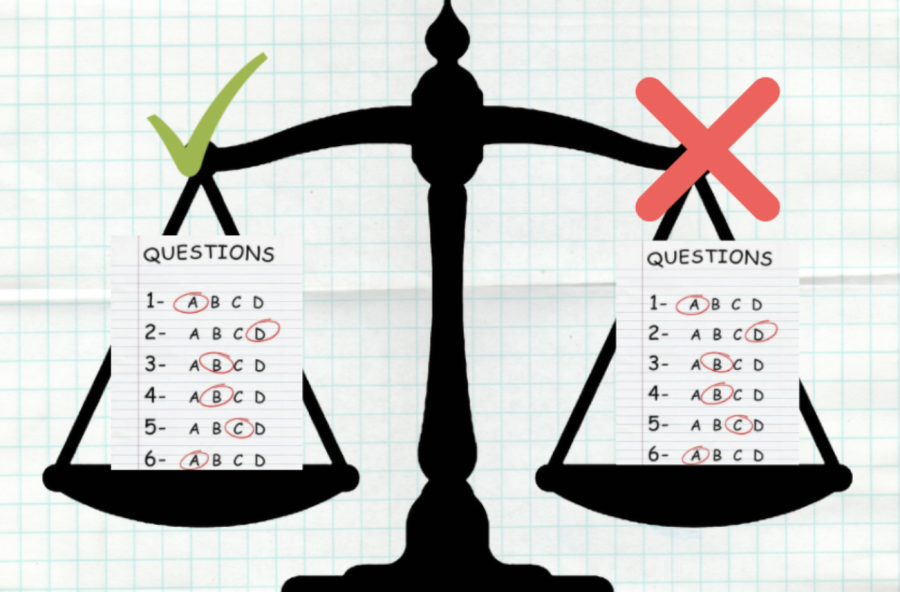WHS teachers discuss the cancellation of midterms
Credit: Emily Roberge
WHS teachers share their differing opinions over the cancellation of midterm exams for the 2021-2022 school year. “I don’t think teachers should test just for the sake of testing,” history teacher Sean Chase said.
February 2, 2022
At Wayland High School, January is normally a month jam-packed with review sessions and midterm exams; however, following a surge of the omicron variant and increased absences of students, the 2021-2022 school year midterm exams were canceled. Initially set to take place on Thursday, Jan. 27. and Friday, Jan. 28, the cancellation of midterms exams created debate among teachers and faculty.
Despite the fact that midterm exams were canceled, this debate proved to be multifaceted.
“Anytime you have a significant number of students who have missed a significant amount of school, it just logistically gets difficult,” physics teacher Laura Kreutter said. “I understand why they were canceled. I was anxious about preparing my students adequately for the midterm when they are out.”
The surge of the omicron variant also brought increased absences for teachers, preventing students from receiving much instruction.
“If the school were to hold midterms, they would in effect be punishing the student for something that is beyond their control,” history teacher Sean Chase said. “That is just not fair to the student, especially if the student had a teacher out because then they are not able to access the curriculum in the same way.”
Aside from the challenges of giving midterms with the increase of COVID-19 cases, some teachers find canceling midterms more detrimental to a student’s learning than beneficial.
“I do feel like it was a detrimental decision canceling midterms in terms of making sure that our courses are modeling the experiences that students have when they go to college,” Kreutter said. “College courses are structured where there are one or two tests, one paper or one project. The world of assessments in college are high-stakes and our students are missing out on the opportunity to practice that.
Some teachers also argue that without midterm exams, students will miss opportunities for standardized test preparation.
“The midterm is helpful for my junior students, who may or may not take an ACT, and it’s that preparation and practice that teaches you how to take a big test,” math teacher Eric Wolven said. “The downside [of canceling midterm exams] is that we prevent learning how to cope with stress from SATs, ACTs or finals in college, and it’s getting this practice in and knowing you’re capable of handling this that goes a long way.”
In some classes, especially math and science courses, the material is cumulative as the course continues. Midterm exams can serve as an indicator of how much knowledge students have retained.
“It would be to your benefit and to my benefit as a teacher to see how well that basic conceptual understanding has been built in your brain,” Kreutter said. “The midterm would help me compare changes I’ve made in instruction, things I’ve done differently from year to year, and this is another reason why the midterm exam is so powerful because it would improve my teaching.”
The flurry of high-stakes assessments brings a greater amount of stress for students. Many find it difficult to complete the midterm exams to the best of their ability with such high levels of stress.
“I think the good thing about getting rid of a midterm exam is that it helps relieve some of the stress and anxiety people are feeling right now,” Wolven said.
Other teachers believe that some stress is an inevitable part of life, and that it is important for students to learn how to cope with it.
“I think not all stress is bad,” Kreutter said. “I think stress is a natural reaction to life. Being able to handle stress and mitigate it is a good skill to have, and it is important to prepare for the experience, not just the night before.”
Although midterm exams did not take place this year, the discussion of midterm exams will continue into later years.
“I don’t think teachers should test just for the sake of testing,” Chase said. “I also don’t think that teachers should test as a form of rest, and I believe that teachers shouldn’t use testing as a way to give themselves a break because it’s not fair to the student.”


























